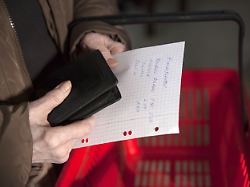What else can we afford?
Pensioner (56): I can’t afford cheese, sausage and yoghurt
07/01/2023 3:12 p.m
Energy and food in particular have become significantly more expensive. Inflation averaged 6.9 percent last year. Bei ntv.de betray regularly people from all salary brackets what that means for your everyday life – what they earn, what they spend how much money on and what is left over at the end of the month. Today:
A former geriatric nurse who is disabled
Surname: I want to remain anonymous*
Age: 56 years
Residence: Lueneburg
Education: geriatric nurse
Recent Activity: I have been retired for 15 years because I am unable to work due to a pulmonary embolism. Later, an operation went wrong and my intestines were badly injured. Several operations followed, and the health consequences still affect me today. I also suffer from post-traumatic stress disorder.
Monthly gross income: 1183 euros – 813 euros pension plus 370 euros basic security (is calculated depending on income and rent)
Household net income per month: 1094 euros. I don’t have to pay taxes, but health and nursing care insurance contributions. I live alone.
Annual special payments: no extra money
Marital status: divorced
Rent per month for a two-room apartment with 45 square meters in assisted living: 580 euros warm, of which 80 euros is a care allowance. I take care of myself, but I use the emergency call button, for example. You can’t find a cheaper apartment, I’ve been looking for my current apartment for nine months.
Monthly costs for heating: 50 Euros
How much these have increased during the energy crisis: Since I moved in, there hasn’t been a utility bill.
Monthly electricity costs: 70 euros
How these have changed during the energy crisis: Dropped from 110 to 70 euros due to the separation from my partner, but now there is no income.
Additional fixed costs per month:
- Internet including landline 44 euros. I don’t want to do without it, the internet is my window to the world. From August, the tariff will be another 5 euros more expensive, but I’m contractually bound for two years.
- mobile 13 euros
- Magenta TV 26 euros
- Sport 15 euros: Chair gymnastics is offered in the assisted living facility. From September there will also be rehabilitation sports in the form of stool gymnastics, hopefully the health insurance company will take care of that.
- Household contents and liability insurance 17 euros
- Medicines that do not require a prescription: 30 euros
The bottom line is disposable household income for groceries, hygiene, leisure, clothing, etc.: 299 euros
How much I spend on groceries: 200 to 250 euros. I can’t afford sausage, cheese or yoghurt, fresh fruit and vegetables only very rarely. Healthy eating is hardly possible anymore. Because of my diabetes, I urgently need to eat healthily and lose weight.
How much more I have to spend on groceries than a year ago: The costs felt like they doubled. There used to be enough money left over to buy my medicines without any problems, now there isn’t. I have to pay for diabetes test strips and medication for the symptoms that follow from my unsuccessful operation and for the side effects of my diabetes treatment myself. My doctor also recommended me to have a stomach reduction, I have to pay part of the costs myself – for the report, half of the nutritional advice and vitamins afterwards. I still don’t even know how to do it.
Where do I save due to high inflation: I only buy the most necessary medicines, which I have to pay for myself. I can’t afford sore throat pills, for example. When it comes to groceries, I pay extreme attention to the prices and cycle to the four supermarkets in the area to find the cheapest deals. The furthest is five kilometers away.
How much I can spend on vacation: Nothing. My last vacation was eight years ago, but my mother paid for it.
How much money is left at the end of the month: Nothing. There used to be a bit left over, I could buy clothes, a year and a half ago even an e-bike, that would no longer be feasible. I couldn’t ride a normal bike without a motor for health reasons. Taking the bus would be a luxury, a one-way ticket costs 2.50 euros. Financially it got really tight a year and a half ago, not only because of the increased cost of living, but also because of the separation from my partner. Everything came at once and I had to move, I spent nine months looking for an affordable apartment.
The details of these most important incomes and expenses are based on self-disclosures and do not claim to be complete.
Exciting, isn’t it? If you would like to take part, please register via email participate[at]ntv.de
Wishes to politicians: That we should finally think about the lower incomes, about the people who live alone and can hardly cope with all that. And to the people who really can no longer work for health reasons and still have to make do with the rate of citizen income. In my opinion, people who can no longer work should get more money than those who are still able, because the latter can top up their basic income. I’m also annoyed that, for example, the chancellor and the federal ministers pocket 3,000 euros to compensate for inflation, while the little man gets nothing.
*The name is known to the editors
